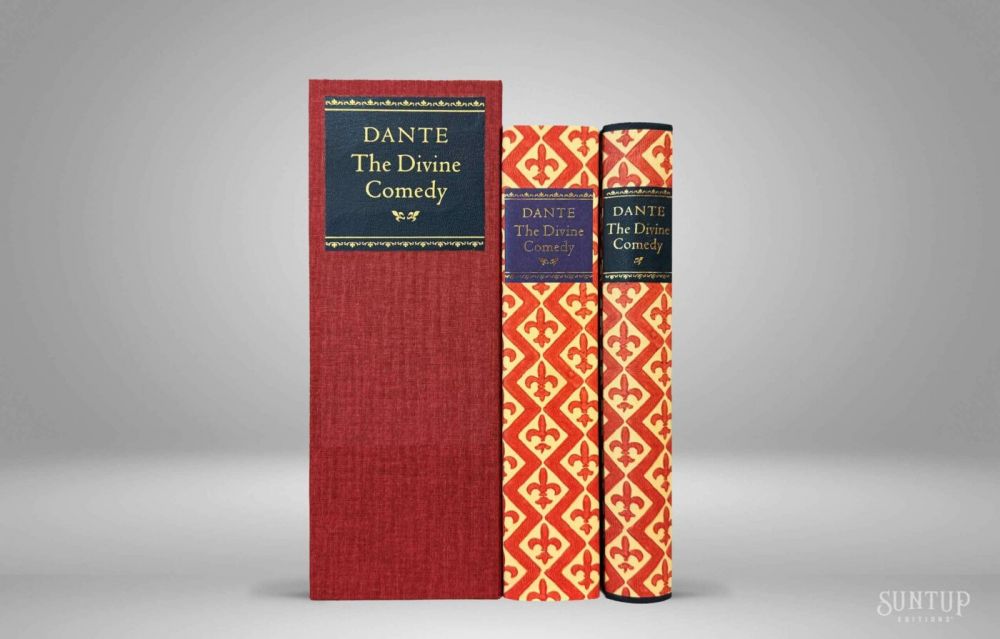The Divine Comedy
Dante Alighieri
The Divine Comedy is an Italian narrative poem by Dante Alighieri, begun ca. 1308 and completed ca. 1321, shortly before the author’s death. It is widely considered the pre-eminent work in Italian literature and one of the greatest works of world literature.
The poem’s imaginative vision of the afterlife is representative of the medieval worldview as it existed in the Western Church by the 14th century. It helped establish the Tuscan language, in which it was written, as the standardized Italian language. It is divided into three parts: Inferno, Purgatorio, and Paradiso.
The poem discusses “the state of the soul after death and presents an image of divine justice meted out as due punishment or reward,” and describes Dante’s travels through Hell, Purgatory, and Heaven. Dante draws on medieval Catholic theology and philosophy, especially Thomistic philosophy derived from the Summa Theologica of Thomas Aquinas. Consequently, the Divine Comedy has been called “the Summa in verse.”
The epic grandeur of Dante’s masterpiece has inspired readers for 700 years and has entered the human imagination; but the further we move from the late medieval world of Dante, the more a rich understanding and enjoyment of the poem depends on knowledgeable guidance. In 1997, Robert and Jean Hollander embarked on the herculean task of creating a beautifully accurate and clear verse translation of the Divine Comedy.
The finished Hollander product was widely regarded as a thing apart, becoming the new standard in English of this essential work. The Los Angeles Times has called it “the most finely accomplished and most enduring translation of this essential work of world literature—from a renowned scholar and master teacher of Dante and an accomplished poet,” while The Economist writes that “the Hollanders act as latter-day Virgils, guiding us through the Italian text.” Indeed, Robert Hollander’s explanatory notes run approximately thirty times the length of the poem itself, incorporating more than forty years of teaching Dante into his commentary. As Christopher Kleinhenz, a professor emeritus of Italian at the University of Wisconsin at Madison, said in an interview, “He has made Dante accessible, [so that] we as contemporary readers can appreciate and can see how Dante was important in the Middle Ages and how he continues to be important today.”
In the seven centuries since its composition, the Divine Comedy remains one of the greatest literary accomplishments of all time.
NUMBERED EDITION
- 7¼” x 10¾” trim size.
- 1,584 pages.
- Limited to 250 copies.
- Signed by Robert Hollander.
- Published in two volumes. Volume I includes the complete English translations of Inferno, Purgatorio and Paradiso by Robert and Jean Hollander; and Volume II, a supplemental volume of over 1,100 pages includes extensive and accessible introductions and generous commentaries that draw on centuries of scholarship as well as Robert Hollander’s own decades of teaching and research.
- Volume I is a Millimeter style binding covered in a decorative paper printed with an historical design from traditional Renaissance Italian woodblock printed papers. Upper and lower edges are capped in blue goatskin from J. Hewit & Sons. The gold foil blocked spine label, and the head & tail bands are goatskin.
- Volume II is a sewn and jacketed softcover, with the jacket glued at the spine and titling in gold foil.
- Volume I includes four tipped on illustrations by William Blake (1757–1827).
- Volume II includes a portrait of Dante by Agnolo Bronzino (1503–1572) as a frontispiece.
- Text pages set in the elegant Centaur type, a serif typeface by book and typeface designer Bruce Rogers, based on the Renaissance-period printing of Nicolas Jenson around 1470.
- Volume I is printed letterpress on Mohawk Via Laid paper in two colors on the title, contents, cantica title and canto pages, by Bradley Hutchinson in Austin, Texas on his Heidelberg Cylinder.
- Volume II is printed by offset lithography.
- The ornament appearing on these pages was designed for this edition by Jerry Kelly and was cut in metal and cast by Ed Rayer at Swamp Press.
- Interior design & typography is by Jerry Kelly.
- Housed in a clamshell enclosure covered in a durable linen cloth with velour lined floors and a leather spine label.
- Bookmark with all pre-orders.
Please note that due to the heavy weight and large size of this edition, postage costs will be higher than usual.
| Publisher | Suntup Editions |
|---|


